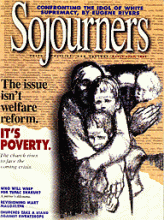In Haiti, people sew Disney clothing for 28 cents an hour when the prevailing local wage is 58 cents. In the United States, Michael Eisner, the CEO of Disney, makes $97,000 an hour. In Indonesia, 13-to-15-year-olds work to make products that likely are for sale in a mall near you. In many places around the United States, manufacturing jobs have disappeared, relocated to other places where labor costs are cheaper.
These facts, of course, are all connected. For many people, their share in the global economy isnt goods and profits, but anxiety, hardship, uncertainty, and a sense of lack of control.
Multinational corporations and free trade are not going away. But might we find the power to help make the local impact of world commerce more benign, so that communities and ordinary peoplenot just CEOs and stockholdersprofit? Church people and others around the country are beginning to try.
In 1995, the National Labor Committee in Support of Worker and Human Rights (NLC) launched a campaign that resulted in The Gap signing an independent monitoring agreement for its plant in El Salvador. Last year Wal-Mart agreed to pull manufacturing of its Kathie Lee Gifford line of clothing from a Honduras factory with abusive conditions.
The most recent campaign, launched late last year, challenged the Disney corporation to withdraw contracts from manufacturers with abusive labor practices, to require contractors to pay a living wage and allow employees the right to organize, and to agree to independent monitoring. Disney was also asked to withdraw from Burma, where half of the profits earned from producing Disney clothing went directly to the repressive Burmese military dictatorship. As a result Disney pledged to pull out of Burma by this past December.
Read the Full Article
